6 books about Resilience (Ecology)
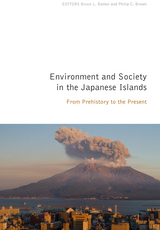
Environment and Society in the Japanese Islands
From Prehistory to the Present
Bruce L. Batten
Oregon State University Press, 2015
Over the long course of Japan’s history, its people profited from their rich natural environment while simultaneously facing significant environmental challenges. Over time, they have altered their natural environment in numerous ways, from landscape modification to industrial pollution. How has the human-nature relationship changed over time in Japan? How does Japan’s environmental history compare with that of other countries, or that of the world as a whole?
Environment and Society in the Japanese Islands attempts to answer these questions through a series of case studies by leading Japanese and Western historians, geographers, archaeologists, and climatologists. These essays, on diverse topics from all periods of Japanese history and prehistory, are unified by their focus on the key concepts of “resilience” and “risk mitigation.” Taken as a whole, they place Japan’s experience in global context and call into question the commonly presumed division between pre-modern and modern environmental history.
Primarily intended for scholars and students in fields related to Japan or environmental history, these accessibly-written essays will be valuable to anyone wishing to learn about the historical roots of today’s environmental issues or the complex relationship between human society and the natural environment.
Environment and Society in the Japanese Islands attempts to answer these questions through a series of case studies by leading Japanese and Western historians, geographers, archaeologists, and climatologists. These essays, on diverse topics from all periods of Japanese history and prehistory, are unified by their focus on the key concepts of “resilience” and “risk mitigation.” Taken as a whole, they place Japan’s experience in global context and call into question the commonly presumed division between pre-modern and modern environmental history.
Primarily intended for scholars and students in fields related to Japan or environmental history, these accessibly-written essays will be valuable to anyone wishing to learn about the historical roots of today’s environmental issues or the complex relationship between human society and the natural environment.
[more]
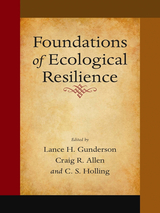
Foundations of Ecological Resilience
Edited by Lance Gunderson, Craig R. Allen, and C.S. Holling
Island Press, 2009
Ecological resilience provides a theoretical foundation for understanding how complex systems adapt to and recover from localized disturbances like hurricanes, fires, pest outbreaks, and floods, as well as large-scale perturbations such as climate change. Ecologists have developed resilience theory over the past three decades in an effort to explain surprising and nonlinear dynamics of complex adaptive systems. Resilience theory is especially important to environmental scientists for its role in underpinning
adaptive management approaches to ecosystem and resource management.
adaptive management approaches to ecosystem and resource management.
Foundations of Ecological Resilience is a collection of the most important articles on the subject of ecological resilience—those writings that have defined and developed basic concepts in the field and help explain its importance and meaning for scientists and researchers.
The book’s three sections cover articles that have shaped or defined the concepts and theories of resilience, including key papers that broke new conceptual ground and contributed novel ideas to the field; examples that demonstrate ecological resilience in a range of ecosystems; and articles that present practical methods for understanding and managing nonlinear ecosystem dynamics.
Foundations of Ecological Resilience is an important contribution to our collective understanding of resilience and an invaluable resource for students and scholars in ecology, wildlife ecology, conservation biology, sustainability, environmental science, public policy, and related fields.
[more]
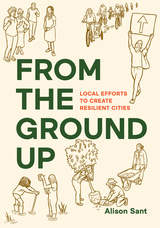
From the Ground Up
Local Efforts to Create Resilient Cities
Alison Sant
Island Press, 2022
For decades, American cities have experimented with ways to remake themselves in response to climate change. These efforts, often driven by grassroots activism, offer valuable lessons for transforming the places we live. In From the Ground Up: Local Efforts to Create Resilient Cities, design expert Alison Sant focuses on the unique ways in which US cities are working to mitigate and adapt to climate change while creating equitable and livable communities. She shows how, from the ground up, we are raising the bar to make cities places in which we don’t just survive, but where all people have the opportunity to thrive.
The efforts discussed in the book demonstrate how urban experimentation and community-based development are informing long-term solutions. Sant shows how US cities are reclaiming their streets from cars, restoring watersheds, growing forests, and adapting shorelines to improve people’s lives while addressing our changing climate. The best examples of this work bring together the energy of community activists, the organization of advocacy groups, the power of city government, and the reach of federal environmental policy.
Sant presents 12 case studies, drawn from research and over 90 interviews with people who are working in these communities to make a difference. For example, advocacy groups in Washington, DC are expanding the urban tree canopy and offering job training in the growing sector of urban forestry. In New York, transit agencies are working to make streets safer for cyclists and pedestrians while shortening commutes. In San Francisco, community activists are creating shoreline parks while addressing historic environmental injustice.
From the Ground Up is a call to action. When we make the places we live more climate resilient, we need to acknowledge and address the history of social and racial injustice. Advocates, non-profit organizations, community-based groups, and government officials will find examples of how to build alliances to support and embolden this vision together. Together we can build cities that will be resilient to the challenges ahead.
The efforts discussed in the book demonstrate how urban experimentation and community-based development are informing long-term solutions. Sant shows how US cities are reclaiming their streets from cars, restoring watersheds, growing forests, and adapting shorelines to improve people’s lives while addressing our changing climate. The best examples of this work bring together the energy of community activists, the organization of advocacy groups, the power of city government, and the reach of federal environmental policy.
Sant presents 12 case studies, drawn from research and over 90 interviews with people who are working in these communities to make a difference. For example, advocacy groups in Washington, DC are expanding the urban tree canopy and offering job training in the growing sector of urban forestry. In New York, transit agencies are working to make streets safer for cyclists and pedestrians while shortening commutes. In San Francisco, community activists are creating shoreline parks while addressing historic environmental injustice.
From the Ground Up is a call to action. When we make the places we live more climate resilient, we need to acknowledge and address the history of social and racial injustice. Advocates, non-profit organizations, community-based groups, and government officials will find examples of how to build alliances to support and embolden this vision together. Together we can build cities that will be resilient to the challenges ahead.
[more]

The Great Salt Lake Food Chains
Fragility and Resiliency
Bonnie K. Baxter
University of Utah Press, 2024
Bonnie K. Baxter explains the trophic structure of Great Salt Lake food chains and resulting impacts from recent years of a shrinking lake and corresponding increases in salinity. Moving from the foundational organisms to brine shrimp, flies, and ten million birds reliant on the lake, Baxter illuminates how salinity and desiccation can affect each level of a complex ecosystem. Presented in the context of current science, she explores the pressures of persistent water diversions and climate change and provides a cautionary tale of a lake on the brink of collapse. Baxter’s hopeful tone, sounding the lake ecosystem’s inherent resiliency, is a welcome voice in the climate conversation and a plea to help save a lake that can survive with a little help from its human neighbors.
[more]
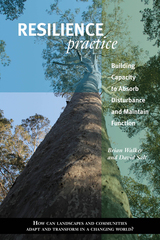
Resilience Practice
Building Capacity to Absorb Disturbance and Maintain Function
Brian Walker and David Salt
Island Press, 2012
In 2006, Resilience Thinking addressed an essential question: As the natural systems that sustain us are subjected to shock after shock, how much can they take and still deliver the services we need from them? This idea caught the attention of both the scientific community and the general public.
In Resilience Practice, authors Brian Walker and David Salt take the notion of resilience one step further, applying resilience thinking to real-world situations and exploring how systems can be managed to promote and sustain resilience.
The book begins with an overview and introduction to resilience thinking and then takes the reader through the process of describing systems, assessing their resilience, and intervening as appropriate. Following each chapter is a case study of a different type of social-ecological system and how resilience makes a difference to that system in practice. The final chapters explore resilience in other arenas, including on a global scale.
Resilience Practice will help people with an interest in the “coping capacity” of systems—from farms and catchments to regions and nations—to better understand how resilience thinking can be put into practice. It offers an easy-to-read but scientifically robust guide through the real-world application of the concept of resilience and is a must read for anyone concerned with the management of systems at any scale.
In Resilience Practice, authors Brian Walker and David Salt take the notion of resilience one step further, applying resilience thinking to real-world situations and exploring how systems can be managed to promote and sustain resilience.
The book begins with an overview and introduction to resilience thinking and then takes the reader through the process of describing systems, assessing their resilience, and intervening as appropriate. Following each chapter is a case study of a different type of social-ecological system and how resilience makes a difference to that system in practice. The final chapters explore resilience in other arenas, including on a global scale.
Resilience Practice will help people with an interest in the “coping capacity” of systems—from farms and catchments to regions and nations—to better understand how resilience thinking can be put into practice. It offers an easy-to-read but scientifically robust guide through the real-world application of the concept of resilience and is a must read for anyone concerned with the management of systems at any scale.
[more]
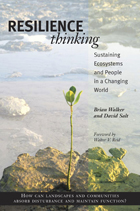
Resilience Thinking
Sustaining Ecosystems and People in a Changing World
Brian Walker and David Salt; Foreword by Walter V. Reid
Island Press, 2006
Increasingly, cracks are appearing in the capacity of communities, ecosystems, and landscapes to provide the goods and services that sustain our planet's well-being. The response from most quarters has been for "more of the same" that created the situation in the first place: more control, more intensification, and greater efficiency.
"Resilience thinking" offers a different way of understanding the world and a new approach to managing resources. It embraces human and natural systems as complex entities continually adapting through cycles of change, and seeks to understand the qualities of a system that must be maintained or enhanced in order to achieve sustainability. It explains why greater efficiency by itself cannot solve resource problems and offers a constructive alternative that opens up options rather than closing them down.
In Resilience Thinking, scientist Brian Walker and science writer David Salt present an accessible introduction to the emerging paradigm of resilience. The book arose out of appeals from colleagues in science and industry for a plainly written account of what resilience is all about and how a resilience approach differs from current practices. Rather than complicated theory, the book offers a conceptual overview along with five case studies of resilience thinking in the real world. It is an engaging and important work for anyone interested in managing risk in a complex world.
[more]
READERS
Browse our collection.
PUBLISHERS
See BiblioVault's publisher services.
STUDENT SERVICES
Files for college accessibility offices.
UChicago Accessibility Resources
home | accessibility | search | about | contact us
BiblioVault ® 2001 - 2024
The University of Chicago Press









